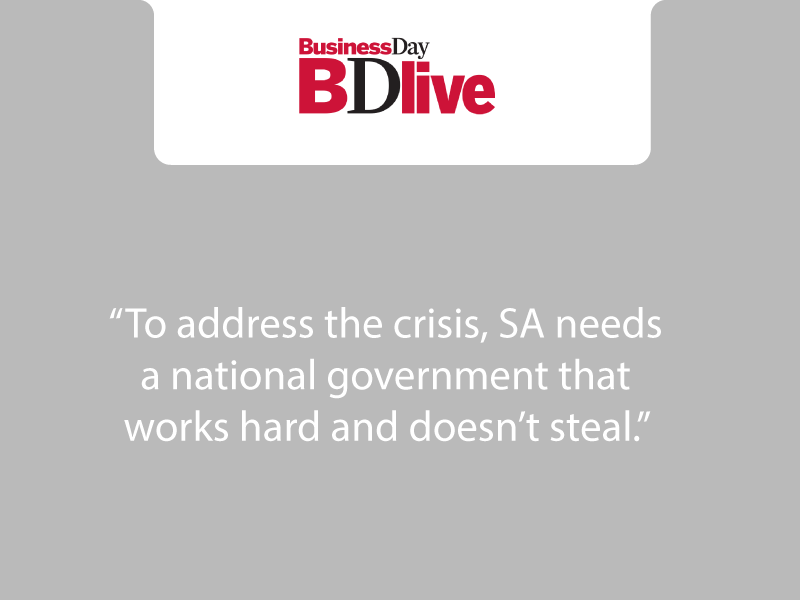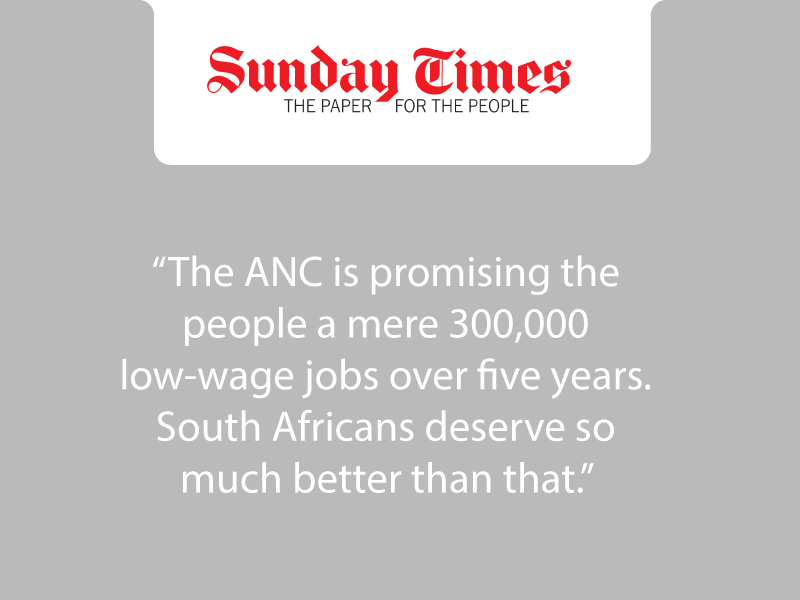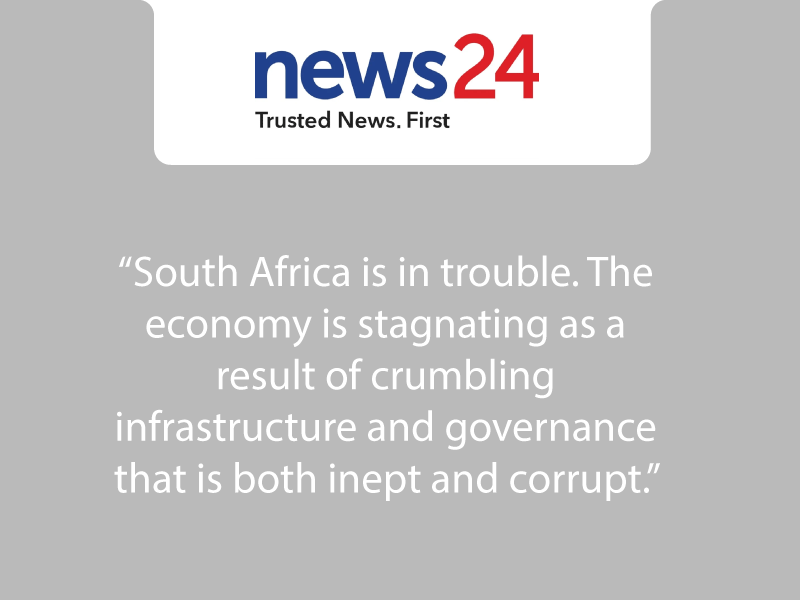
NURTURING SMALL BUSINESS
DEMOCRATIC SA’s efforts to promote small and medium enterprises have had disappointing results. By comparison with countries such as Chile, Thailand, Mexico and other emerging markets SA establishes, sustains and grows fewer businesses per head of population.
Recent statistics suggest performance has been deteriorating. Enterprise promotion through public expenditure should be an investment that reaps dividends. In SA it may have been more of a misplaced subsidy.
A decade after small business was accorded a central place in government’s development strategy we still know too little about it, expect too many different things of it and do not have a focused strategy to develop it.
Our information on the basics lacks authority how many enterprises are there, of what sizes, in what sectors?
SA’s poor comparative performance does not mean we lack entrepreneurial potential. Research by the Centre for Development and Enterprise has documented far too many examples of successful entrepreneurs in SA to support such a gloomy verdict.
In SA today there are many more cases of people who are meeting opportunity with ingenuity, converting political freedoms into economic emancipation.
Nor is SA’s poor showing the result of neglect on the part of the new democratic government. The 1995 white paper and the 1996 act laid the foundations for government backing of small, medium and micro enterprises, which were assigned a central place in the country’s development strategies.
Enterprise-supporting bureaucracies were set up with mandates to enhance skills, facilitate access to finance and do research that would guide policy development. Yet eight years later, enterprise support seems bogged down in continuing re-evaluation and restructuring.
The overall strategy promised in light of government’s frank admission that an overhaul is necessary has not been forthcoming though the president’s recent announcements in his state of the nation speech give some hope of movement.
Research indicates several causes for the widely recognised underperformance of government programmes.
Enterprise support has had to serve too many purposes. Support for entrepreneurs has often been used as a vehicle for poverty relief. This confusion of priorities sends the wrong messages about business development and detracts from the goal creating wealth.
Support for entrepreneurs has been driven by state-led delivery of finance and skills, rather than a demand-driven strategy which exploits partnership possibilities with the private sector.
The conventional wisdom has been that limited access to loan finance is the main obstacle to enterprise growth. As is often the case, conventional wisdom is contradicted by factual research.
Entrepreneurship support has been seen in too narrow a light. For instance, far more could have been done in revamping immigration laws to encourage immigrant entrepreneurs. It has been a global pattern that poverty-stricken immigrants become prosperous, and in doing so make th eir new home countries more prosperous.
Most important of all, however, is the neglect of the fundamental premise of entrepreneurship support. Encouraging a facilitative environment in which to found and grow businesses will do more to clear the way for rising rates of entrepreneurial activity than faith in the capacity of state bureaucracies to deliver the right things to the right people.
Guided by the evidence, it is time to accept the failure of the current approach. Government support for entrepreneurship in SA has been largely misdirected.
International studies downplay access to loan finance. They support demand-driven, market-led skills development and suppor t. There is evidence of home-grown success there are numerous case histories of successful black South African entrepreneurs .
The costly bureaucracy that aims to deliver finance and skills training to emergent entrepreneurs often misses its target. As a result, there have been institutional failures and very high default rates among those who have been lent money, while training and advice has largely been provided and managed by people with no business experience.
There is a better approach. Facilitating a hospitable environment for small business by improving the regulatory climate, ensuring cheap and effective infrastructure and public-private partnerships will do more to encourage aspirant entrepreneurs than relying on bureaucratic delivery of financial and other support.
As one World Bank study states: “A good SMME (small, medium and micro enterprise) strategy is in reality a good private sector development strategy.”
Government should assign a high priority to promotion of entrepreneurship and make a decisive shift from state delivery to facilitation as a policy principle.
This does not mean leaving emerging entrepreneurs to sink or swim. It simply means that insofar as resources are devoted to enterprise support, they should be delivered through smart partnerships between public and private sectors.
We need a high-level public-private task team to make recommendations for reducing the costs of doing business in SA within a wider framework than government’s efforts to lower the operating costs of small and medium enterprises.
Business costs include: security against crime; complex tax regulations; special levies added to the tax burden; labour costs including compl iance with complex labour regulations; inadequate or costly infrastructure; and delays in the granting of work permits for foreigners.
The establishment of a regulatory impact unit in the presidency would follow international best practice in fostering private sector development.
The aim of this unit would be to review all proposed legislation before it is passed by Parliament to assess the effect of its passing on the costs of doing business in SA in future.
A crucial research finding is that only one other factor a country’s level of available skills is as strongly correlated with per capita income growth as an appropriate regulatory environment.
As far back as 1999, a governmentappointed task team recommended this very principle as a way of encouraging small business development.
We should be building on private sector strengths by shifting the emphasis of direct entrepreneurship support from the state or quasi-state agencies to competitive private-sector providers by providing incentives to work with new emerging entrepreneurs as clients.
In the same way, incentives for large companies to subcontract to smaller businesses and to promote emerging entrepreneurs could do much to help.
A serious information deficit hampers effective policy making. We need to know more about what is actually happening in the economy. In the long run, policies that do not promote genuine economic growth through expanding successful entrepreneurship will not serve black economic empowerment.
Much of the conventional wisdom about entrepreneurship in SA has focused on obstacles and constraints. However, success needs its champions.
The country needs to identify, publicise and celebrate black and white South Africans who have become successful entrepreneurs through their own resourcefulness and against the odds. Make them the new struggle heroes of the second decade of democratic rule.
There are many individuals from different backgrounds, in disparate fields, who have converted opportunity into successful entrepreneurship.
We can do better if we provide the best possible enabling environment for aspiring entrepreneurs to grow their businesses, if we shift the direction of enterprise support from government bureaucracy to public-private partnership, and if we give already successful entrepreneurs the recognition they deserve.
Then their ranks will multiply in an expanding and flourishing non-racial business sector.
- Article by Ann Bernstein and Sandy Johnston




